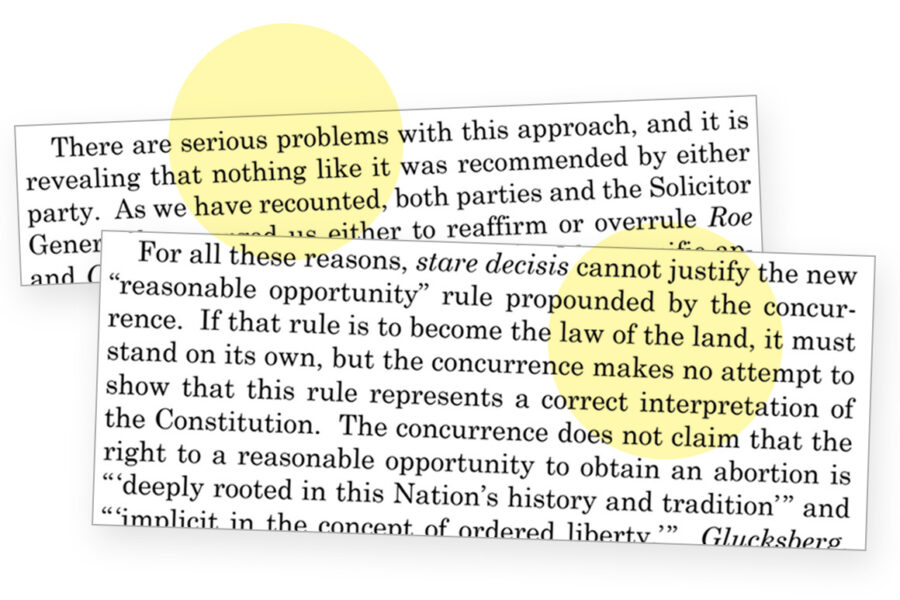What changed from Justice Alito’s draft opinion to final ruling on Roe

Supreme Court Justice Samuel Alito’s sharp opinion revoking the constitutional right to abortion is virtually unchanged from his initial draft opinion overturning Roe v. Wade compared to the final text of the decision handed down by the high court Friday morning.
Despite fierce lobbying from outside forces to pull back from the precipice of overturning Roe, Alito’s writing contains all 10 key passages POLITICO identified in early May as the critical pieces of the abortion ruling.
But Alito did add to his original opinion, with a fierce rebuttal of the court’s liberal dissenters, plus a direct shot at Chief Justice John Roberts in the final text. Roberts was the only conservative justice on the court to side with its three liberals, making the final vote 5-4 in the decision to strike down Roe and give states the green light to ban abortion.
Here’s what’s new in Alito’s final draft:
‘Serious problems’ with Roberts’ approach
Roberts in his concurring opinion attempted to stake out a middle ground for the court, arguing that it didn’t need to end Roe in its entirety and instead could have upheld upheld Mississippi’s 15-week limit on abortion.
Alito in his final opinion takes issue with Robert’s reasoning — in which the chief justice supports leaving the constitutionality of tighter abortion restrictions to future cases — claiming there are “serious problems with this approach.”
Alito blasts Roberts for attempting to find a “middle way” in the contentious decision, which Alito claims will only “prolong” the “turmoil” of Roe. Alito argues that by only ruling that Mississippi’s 15-week law is constitutional, the high court would soon be called upon to decide the constitutionality of other states’ laws with shorter or longer deadlines for obtaining an abortion.
“The concurrence’s quest for a middle way would only put off the day when we would be forced to confront the question we now decide,” Alito writes. “The turmoil wrought by Roe and Casey would be prolonged. It is far better—for this Court and the country—to face up to the real issue without further delay.”
‘Reasonable opportunity’ is not constitutional
Alito also took aim at the argument Roberts laid out for giving people seeking an abortion a “reasonable opportunity” to obtain one, such as in Mississippi’s ban on abortion after 15 weeks of pregnancy. Alito said there are no constitutional grounds for upholding that rule, and that since Roberts made no claim that the right to an abortion is constitutional, his proposal to uphold the Mississippi limit would also not be supported by the Constitution.
“If the Constitution protects a woman’s right to obtain an abortion, the opinion does not explain why that right should end after the point at which all ‘reasonable’ women will have decided whether to seek an abortion,” Alito writes.
Dissent can’t show ‘constitutional right to abortion’
Alito’s final opinion also differs from the draft document because it adds a rebuttal to the three liberal justices’ dissent.
Justices Stephen Breyer, Sonia Sotomayor and Elena Kagan delivered the scathing dissent that rebuked the court for upending the “balance” Roe had cemented for nearly 50 years between “respecting a woman as an autonomous being” and protecting the life of a fetus.
But Alito undermined the justices’ argument in his final opinion, claiming they failed to show that a constitutional right to abortion exists or identify any pre-Roe authority that supports the right.
Roe can’t be defended on ‘prior precedent’
Alito also shot down the dissenters’ argument that Roe could be defended on prior court precedent, since none of the precedents the case was based on “involved the destruction of what Roe called ‘potential life.’”
The justice also argued that “adherence to precedent is not ‘an inexorable command.’” He went on in his opinion to name instances in which the court did overrule prior precedents, such as overturning the “separate but equal” doctrine in both Brown v. Board of Education and Plessy v. Ferguson.
Dissent ignores ‘states’ interest in protecting prenatal life’
The liberal justices highlighted in their dissent the potential fallout the decision could have, such as states using the newfound power to impose criminal penalties on abortion providers or people seeking abortions.
Alito slammed the justices on this point, claiming they have no “regard for a State’s interest in protecting prenatal life.” He said their implication in their dissent is clear — that the liberal justices believe the Constitution doesn’t permit states “to regard the destruction of a ‘potential life’ as a matter of any significance.”
He also took aim at the justices for their praising of the “balance” that a viability line for abortion can strike between a woman’s autonomous being and the state’s interest in protecting the life of a fetus. Alito instead argued that a viability line “makes no sense.”
“It was not adequately justified in Roe, and the dissent does not even try to defend it today,” Alito writes.
Go To Source
Author: POLITICO

